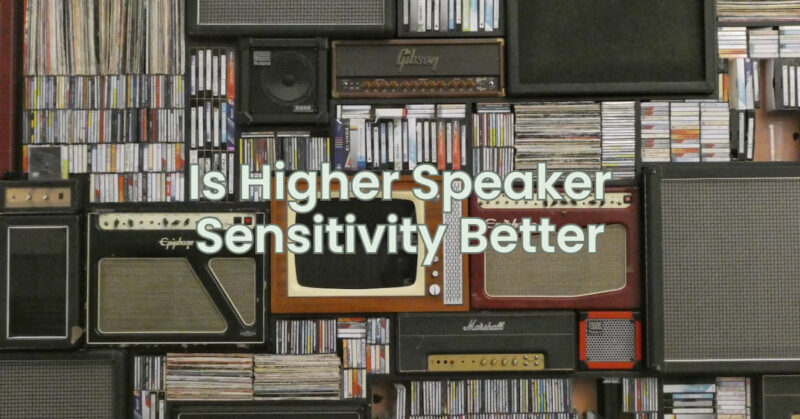When it comes to evaluating speakers, one often encounters the term “speaker sensitivity.” Sensitivity measures the sound pressure level (SPL) produced by a speaker with a given amount of power. It is commonly believed that higher sensitivity is always better, as it implies louder sound output. However, the reality is more nuanced. In this article, we will explore the concept of speaker sensitivity and shed light on the factors that determine whether higher sensitivity is indeed better for your specific audio needs.
Understanding Speaker Sensitivity: Speaker sensitivity is typically measured in decibels (dB) and represents the sound output produced by a speaker when given a specific amount of power. Higher sensitivity ratings indicate that a speaker can produce louder sound levels with the same input power. For example, a speaker with a sensitivity rating of 90 dB will produce a higher sound output than a speaker with a sensitivity rating of 85 dB when both are given the same power.
The Benefits of Higher Sensitivity:
- Efficient Power Usage: Speakers with higher sensitivity ratings require less power to achieve the same volume levels as speakers with lower sensitivity ratings. This efficiency can be advantageous when using low-powered amplifiers or in situations where power conservation is a priority.
- Dynamic Range: Higher sensitivity allows speakers to produce greater dynamic range, capturing the subtle nuances and details in audio recordings. This can result in a more immersive and engaging listening experience, particularly for genres that demand high fidelity and intricate sound reproduction.
- Compatibility with Low-Powered Amplifiers: If you have a low-powered amplifier or plan to use a receiver with modest power output, speakers with higher sensitivity can still deliver satisfying volume levels without straining the amplifier. This compatibility ensures a balanced and distortion-free sound output.
Considerations Beyond Sensitivity: While higher sensitivity can be advantageous in certain scenarios, it is important to consider other factors that contribute to overall audio quality and system performance:
- Room Size and Acoustics: The size and acoustic properties of your listening room play a crucial role in determining the appropriate sensitivity levels for your speakers. In smaller rooms or spaces with sound absorption materials, speakers with lower sensitivity may still achieve satisfactory volume levels without overpowering the space.
- Desired Volume Levels: Your desired listening levels should also guide your choice of sensitivity. If you prefer lower volume levels for casual listening or have neighbors or shared living spaces to consider, speakers with lower sensitivity may be sufficient.
- System Matching: It is essential to ensure compatibility between the sensitivity of your speakers and the power output of your amplifier or receiver. An amplifier that is over or underpowered for your speakers can impact sound quality and potentially damage the speakers. Consulting manufacturer guidelines or seeking professional advice can help achieve an optimal match.
- Sound Quality and Driver Performance: Sensitivity is just one aspect of sound quality. Other factors such as driver quality, speaker design, frequency response, and distortion levels also contribute to overall audio performance. It is essential to evaluate speakers holistically and consider the complete set of specifications to determine the best fit for your specific needs.
Conclusion: While higher speaker sensitivity can offer benefits such as efficiency, dynamic range, and compatibility with low-powered amplifiers, it is not universally better in all situations. The ideal sensitivity level depends on factors such as room size, desired volume levels, system matching, and overall sound quality. It is important to strike a balance between sensitivity and other crucial factors to create an audio system that caters to your specific needs and preferences. By considering the complete set of specifications and understanding how sensitivity interacts with other performance factors, you can make an informed decision when selecting speakers and achieve an audio experience that satisfies your unique listening requirements.


